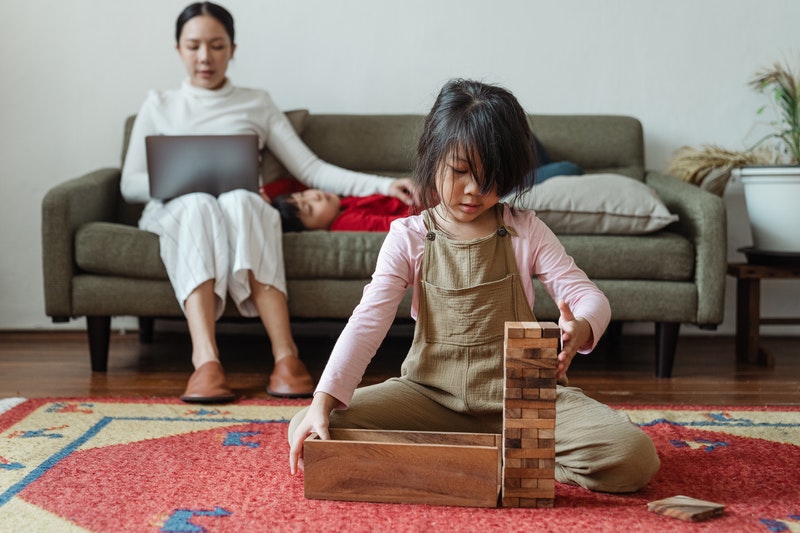How can parents establish a sense of normality during lockdown, while keeping the kids busy, healthy and sane? We have some age-appropriate times for those struggling with lockdown.
The highly contagious Delta variant is showing us that home learning, working from home and COVID-19 restrictions will be part and parcel of our daily lives for some time yet. As a result, we’re suddenly faced with the harsh reality of not only being a parent, but suddenly becoming a teacher’s assistant, school canteen staff member and office administrator all rolled into one.
For those trying to work from home on top of all of those roles, there’s the additional complication of keeping the kids occupied, fed and safe in a clean house while attending Zoom meetings, client calls and answering emails.
When we’re all staying home, routine is often the first thing to go. Paradoxically, routine is actually more important now than before. Educators know the importance of routines in the classroom. It allows for a sense of predictability that brings calm to the class, helping children feel comfortable with the familiar routine.
Although parents cannot hope to exactly replicate their child’s classroom brick by brick, they can at least establish the same kind of familiar routine. Here are 11 steps to introduce some routine into your lockdown life. Make sure you don’t miss our plus age-appropriate tips that will keep things interesting for your children.
Read: How to stay positive during lockdown
1. Be kind to yourself
First and foremost, be patient and kind to yourself and your child if routines aren’t followed to the letter. We are, after all, in a global pandemic.
When it comes to activities and talks with your child’s school, do your best, but don’t feel bad if sometimes your best isn’t, well . . . the best. Understand and appreciate that life is complicated and your involvement in your child’s school life may be sporadic. Just because you’re working and learning in the same physical space doesn’t mean you can be mentally available for them 24/7.
2. Be predictable, but flexible

It’s really important to keep routines predictable, comfortable and flexible. In order to establish or re-establish a comfortable routine, the following questions might help:
- When does your child learn best?
- When do they need breaks, playtime, physical activity and free time?
- When is a good time for family time?
- What chores and home responsibilities does your child have?
3. Start a morning ritual
Set a consistent wake-up time so everyone is getting dressed and building their independence by selecting their own clothes. Try to make the space and time for nutritious and regular meal times, but also learn to accept that sometimes, an oven dinner is as good as it’s going to get—especially in a lockdown!
Need recipe inspiration?
4. Designate areas
Try to designate a space that suits both your child’s age and learning ability, including a play area as well as a study area. These don’t need to be large, but should be just enough for your child to feel like they have a space that’s “theirs”.
5. Enlist help
Try to stay in touch with your child’s teacher(s) for guidance, support and suggestions wherever possible. They will most likely be filled with ideas and inspiration for tackling those times when your child doesn’t want to learn, or simply to make the learning environment more fun and playful.
In the video below, psychologist Collett Smart shares ways to overcome some common homeschooling challenges.
6. Encourage independence
Establish boundaries and encourage your child to actively participate in remote learning without constant input from you.
7. Keep clean
Good hygiene habits are another important part of establishing a routine and is something that is particularly vital during lockdown. Making bath time, teeth and hair-washing a fixed part of the routine will help massively.
8. Make peace with screen time
Accept that in most houses, screen time is inevitable. It can be a sanity saver, so don’t feel guilty about scheduling some screen time into your family’s routine. Remember, worthwhile content can help maintain and improve language and comprehension skills.
9. Allow creativity
Make time for artistic experiences, which could mean:
- Listening to music
- Dancing
- Singing a song
- Painting
- Drawing
- Drawing with pavement chalk
- Scavenger hunts
- Collecting things around the house
10. Establish a bedtime ritual
Establish a consistent bedtime with calming rituals like reading a bedtime story, singing a lullaby or cuddling with a favourite stuffed toy.
11. Schedule time for play
Routines shouldn’t just be all about chores and tasks, so make sure to schedule regular time for fun and play with the family. This could be something like a “body break” during the day, or physical activity and time outdoors if social distancing allows. Gardening, walking the dog or doing a fun YouTube workout video together can help you connect with your child while staying active.
Play is a part of learning and can reduce stress by boosting joy, laughter, and calm feelings—all incredibly important in the middle of a potentially stressful lockdown. Play isn’t just good for children but can be incredibly helpful to adults’ wellbeing too.
Here are some age-specific ideas for building that all-important playtime into your routine:
Lockdown activities for toddlers
Consider activities that involve fine motor skills and help strengthen your child’s hand-eye coordination. Even seemingly simple tasks like filling containers with water and dumping them out repeatedly can be a great option to pass the time and add a bit of variety to the routine.
While activities like these might look like a simple activity to an adult, it is actually building a child’s fine motor skills and hand-eye coordination. It also begins their understanding of cause and effect, and helping build an understanding of the properties of water.
Read: 12 lockdown-friendly activities for kids to support their development
Lockdown activities for preschoolers
Preschool-aged children might enjoy making “pizza” with playdough and sharing it with you to “eat”. They’ll be building fine motor skills and social language, along with numeracy concepts such as bigger than, smaller than, same as, divide and equal.
Many materials you can easily find at home can be considered “toys”, including plastic food storage containers and lids, sponges, cardboard or plastic boxes, pots and pans, bubble wrap, toilet rolls, paper towel rolls, old cards and magazines, or even a big bowl of soapy water.
Lockdown activities for primary school-aged children
Ways to implement play into an at-home routine include clearing a space for practising dance, martial arts, yoga or Zumba. Other ideas include cooking meals together, holding a karaoke night or getting creative by making TikTok or YouTube videos.
Don’t object to energetic, loud play from your children. Understand that they need to expend pent-up energy, just as they would do at school during their routine break time. While lockdown is an incredibly challenging time for the entire family, play can be a silver lining. It helps build a stronger parent-child bond, reduces stress and creates lasting memories.
It’s time to stop struggling with lockdown

Ultimately, remember that overburdening yourself with heavy expectations for home learning and setting the perfect routine is unfair and gets in the way of the most important things: Health, happiness and optimism about the future.
Setting a family routine is meant to be a supportive aid, not a rigid list of “must do” rules that you should stick to no matter the cost. Whatever the situation, the best course of action is always to remain calm, kind and flexible in your routines.
The ultimate aim should be to provide a structure within which your children can feel supported and loved during this difficult period.
How helpful was this article?
Click on a star to rate it!
0 / 5. 0
Be the first to rate this post!
Carlos Ferri
Related posts
Subscribe
Receive personalised articles from experts and wellness inspiration weekly!


